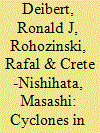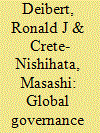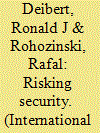|
|
|
Sort Order |
|
|
|
Items / Page
|
|
|
|
|
|
|
| Srl | Item |
| 1 |
ID:
110833


|
|
|
|
|
| Publication |
2012.
|
| Summary/Abstract |
While the rhetoric of cyber war is often exaggerated, there have been recent cases of international conflict in which cyberspace has played a prominent role. In this article, we analyze the impact of cyberspace in the conflict between Russia and Georgia over the disputed territory of South Ossetia in August 2008. We examine the role of strategic communications, information operations, operations in and through cyberspace, and conventional combat to account for the political and military outcomes of the conflict. The August 2008 conflict reveals some emergent issues in cyber warfare that can be generalized for further comparative research: the importance of control over the physical infrastructure of cyberspace, the strategic and tactical importance of information denial, the emergence of cyber-privateering, the unavoidable internationalization of cyber conflicts, and the tendency towards magnifying unanticipated outcomes in cyber conflicts - a phenomenon we call 'cyclones in cyberspace'.
|
|
|
|
|
|
|
|
|
|
|
|
|
|
|
|
| 2 |
ID:
114221


|
|
|
|
|
| Publication |
2012.
|
| Summary/Abstract |
States are moving to assert their interests more forcefully in cyberspace and associated governance regimes. Traditionally, transnational networks of engineers, based primarily in the United States and Europe, have been the primary architects of cyberspace governance, with the users and private sector shaping cyberspace itself. However, governments are becoming increasingly influential across a number of governance forums and are deliberating on how to exercise power in and through cyberspace. Particularly noteworthy are how nondemocratic states outside of Europe, North America, and parts of Asia have begun to forcefully assert their interests in cyberspace governance regimes, including some, like the International Telecommunications Union, that were previously marginalized in the Internet space. Western liberal democracies are also moving away from laissez-faire and market-oriented approaches to more state-directed controls and regulations. Drawing from international relations theory literature, and in particular constructivist approaches, this article examines international and global mechanisms and dynamics that explain the growth and spread of cyberspace controls. It also provides a study of "norm regression" in global governance: the growth and spread of practices that undercut cyberspace as an open commons of information and communication.
|
|
|
|
|
|
|
|
|
|
|
|
|
|
|
|
| 3 |
ID:
095500


|
|
|
|
|
| Publication |
2010.
|
| Summary/Abstract |
Conceptualizations of cyberspace security can be divided into two related dimensions, articulated as "risks": risks to the physical realm of computer and communication technologies (risks to cyberspace); and risks that arise from cyberspace and are facilitated or generated by its technologies, but do not directly target the infrastructures per se (risks through cyberspace). There is robust international consensus, growing communities of practice, and an emerging normative regime around risks to cyberspace. This is less the case when it comes to risks through cyberspace. While states do collaborate around some policy areas, cooperation declines as the object of risk becomes politically contestable and where national interests vary widely. These include the nature of political opposition and the right to dissent or protest, minority rights and independence movements, religious belief, cultural values, or historical claims. The contrast between the domains has led to contradictory tendencies and paradoxical outcomes.
|
|
|
|
|
|
|
|
|
|
|
|
|
|
|
|
|
|
|
|
|